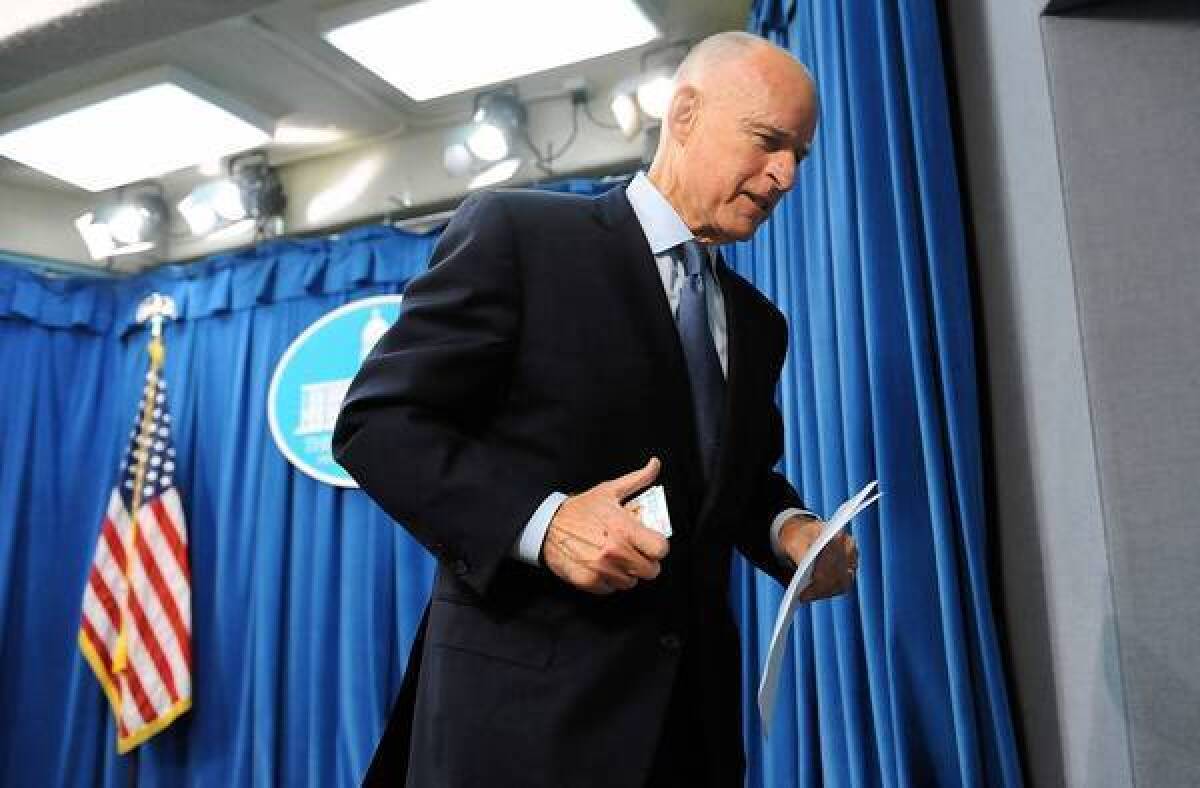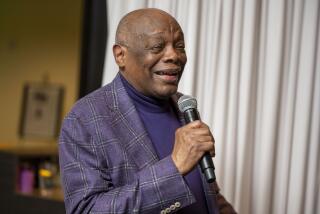Jerry Brown being treated for prostate cancer

- Share via
SACRAMENTO — Gov. Jerry Brown is receiving radiation treatment for early stage prostate cancer, his office announced Wednesday.
The 74-year-old governor is undergoing “conventional radiotherapy” and maintaining a full work schedule during the treatment, according to a statement released by the governor’s office.
“Fortunately, this is early stage localized prostate cancer,” Dr. Eric Small, Brown’s oncologist at UC San Francisco, said in the statement. “The prognosis is excellent, and there are not expected to be any significant side effects.”
The governor’s office said the treatment will be completed the week of Jan. 7, about the time Brown is expected to unveil his proposed budget and deliver a State of the State address.
Brown’s spokesman Gil Duran declined to provide details about when the governor was diagnosed, what form of radiotherapy he is receiving and the stage of his cancer.
“We have no further comment,” Duran said.
This is the governor’s second bout with cancer during his return engagement as California’s chief executive. Last year, he had a cancerous growth removed from the right side of his nose and some reconstructive surgery. He had been treated for the same type of cancer — basal cell carcinoma — in 2008, when he had a small spot removed near his right ear.
Although it was one of the most common, curable forms of skin cancer, Brown’s office did not disclose that the governor had it last year until after he had been treated. Reporters had earlier asked about a bandage on Brown’s nose following a biopsy, and his wife, Anne Gust Brown, had denied it was cancer.
Brown’s most recent diagnosis is a blow to his healthy image. At 74, he is California’s oldest governor and has gone out of his way to show that his age and health are of no concern. He has challenged reporters to pull-up contests — and won — jogs in the Oakland hills and around the Capitol, and he boasts of his running time.
He made headlines in August after challenging New Jersey Gov. Chris Christie to “a three-mile race, a push-up contest and a chin-up contest.” “Whatever he wants to bet,” Brown said, “I have no doubt of the outcome.”
Medical experts said the information provided by Brown’s office Wednesday suggests he has an excellent chance of recovery, with minimal disruption to his normal schedule.
Besides skin cancer, prostate cancer is the most common cancer in U.S. men, according to the American Cancer Society. The organization estimates that about one out of six men will be diagnosed with the disease during his lifetime, and most cases occur in older men.
Nearly all men diagnosed with early stage prostate cancer have high “cure” rates, meaning they will be disease-free after five years.
The fact that Brown’s cancer is localized means that it has not invaded other organs, making it easier to treat, said Dr. Israel De Alba, an assistant clinical professor of medicine at UC Irvine. An external beam of radiation will probably be focused on the cancer for a few minutes a day, as opposed to more invasive therapy that involves putting radioactive material inside the prostate, physicians said.
Possible side effects include nausea, vomiting and pain in the treated area.
“Most patients that we see have a normal life and continue with their usual activities,” De Alba said.
Other doctors agreed, noting the early stage of the disease.
“It won’t affect his function as governor,” said Dr. David B. Agus, a prostate cancer expert who is a professor of medicine and engineering at USC. “He will be able to function in his job and reduce our deficit.”
Doctors also praised Small, Brown’s oncologist, whom they described as one of the world’s premier experts on prostate cancer.
“He’s in very good hands,” said Stuart Holden, director of the Warschaw Prostate Cancer Center at Cedars-Sinai Medical Center in Los Angeles. “I would say his chances of living 10 to 15 years is in excess of 80%, assuming nothing else gets him.”
Times staff writer Chris Megerian contributed to this report.
More to Read
Get the L.A. Times Politics newsletter
Deeply reported insights into legislation, politics and policy from Sacramento, Washington and beyond. In your inbox twice per week.
You may occasionally receive promotional content from the Los Angeles Times.











